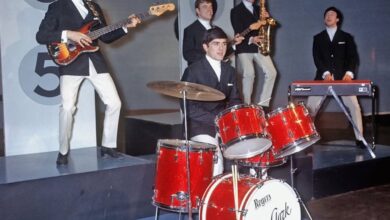John Denver’s “Annie’s Song” Becomes a Soaring Expression of Love and a Defining Moment in 1974
In 1974, John Denver released what would become not just one of his most cherished compositions, but also a cornerstone of the modern love song canon. “Annie’s Song,” a tender and soaring ballad written for his then-wife Annie Martell, reached No. 1 on both the Billboard Hot 100 and the Easy Listening charts. Its simple lyrics and heartfelt sincerity struck a universal chord with audiences around the world, cementing Denver’s reputation as one of the most emotionally resonant singer-songwriters of his generation.
Born Henry John Deutschendorf Jr. in Roswell, New Mexico, Denver found his voice in the folk revival of the late 1960s and early ’70s. He first gained prominence as a member of the Chad Mitchell Trio before striking out on his own. With his gentle tenor, earnest demeanor, and naturalistic songwriting style, Denver was both a product of his time and a bridge between generations. His music carried the optimism of the ’60s into the introspective warmth of the ’70s, giving listeners an artist who was both sincere and deeply relatable.
“Annie’s Song” was written in a moment of clarity and emotion. Denver reportedly composed the lyrics in just ten minutes while riding a ski lift in Aspen, Colorado, after a particularly intense argument with Annie. As the lift ascended, the beauty of the surrounding mountains overwhelmed him and brought him back to the deep affection he felt for his wife. The song, then, became an immediate act of reconciliation—a declaration of love drawn directly from the grandeur of nature and the fragility of human connection.
The song’s arrangement is deceptively simple, yet powerfully effective. It opens with a gentle orchestral swell, led by acoustic guitar and strings, supporting Denver’s unadorned vocals. There is no elaborate production, no flashy instrumentation—just an honest voice carrying heartfelt words. The melody itself is said to have been inspired in part by the second movement of Tchaikovsky’s Fifth Symphony, giving the tune a classical elegance that adds to its timeless quality. Milt Okun, Denver’s longtime producer, kept the arrangement spacious and open, allowing every word to land with clarity and warmth.
Upon its release in June 1974, “Annie’s Song” quickly resonated with listeners. It became Denver’s second No. 1 single on the Billboard Hot 100 and also reached the top of the UK Singles Chart—his only chart-topper there. It went on to sell over a million copies in the United States alone. Critics praised its emotional sincerity and melodic grace, and fans embraced it as both a wedding anthem and a personal ode to romantic devotion. It would become one of Denver’s signature songs, known across generations.
The impact of “Annie’s Song” went far beyond chart success. In an era marked by political disillusionment and social change, the song’s earnestness and vulnerability felt refreshing. It offered an intimate counterpoint to the prevailing cynicism in American pop culture, celebrating love without irony or pretense. For many, it was a reminder that beauty could be found in the everyday—that the love between two people could be as vast as the sky, as deep as a forest, as gentle as the breeze.
The song also marked a turning point in Denver’s career. Already a successful artist, the immense popularity of “Annie’s Song” opened the door to new audiences and solidified his place in the mainstream. He became a frequent guest on television, headlined international tours, and gained widespread acclaim not just for his music, but for his environmental advocacy and humanitarian work. “Annie’s Song” gave him the visibility to become a cultural figure, not just a chart-topping artist.
Its influence on other musicians and genres was equally notable. The stripped-down sincerity of “Annie’s Song” inspired a wave of singer-songwriters in the folk-pop vein. Artists like Dan Fogelberg, James Taylor, and later, Ed Sheeran, followed a similar blueprint—writing emotionally honest songs with lush but minimal arrangements. The song’s success also encouraged record labels to take more chances on personal, acoustic-driven material during a decade dominated by disco and rock excess.
Many artists have covered “Annie’s Song” over the years, each offering a new shade of interpretation. Notable renditions include those by James Galway, who transformed it into a flute instrumental classic, and Glen Campbell, who brought his own country-inflected warmth to the track. Its gentle melody has made it a popular choice for weddings, memorials, and tribute concerts—a testament to its deep emotional resonance and universal message.
The song was released during a time of personal transformation for Denver and Annie. Though their relationship would eventually end in divorce in 1982, the song remains a frozen moment of pure feeling—an expression of love untouched by time or circumstance. Denver never stopped performing it, even after the separation, and always spoke of it with a sense of gratitude and humility.
Decades after its debut, “Annie’s Song” continues to receive regular radio play and is included in virtually every John Denver compilation. It has been featured in film, television, and commercial soundtracks, proving its enduring place in popular culture. It also remains one of the most-requested love songs on radio stations and streaming platforms alike—a quiet testament to its lasting impact.
The track helped shape future developments in acoustic songwriting and production, reinforcing the idea that a song doesn’t need bombast to be powerful. Its emotional clarity and straightforward structure became a model for countless artists seeking to convey deep feelings through simple means. In a world increasingly obsessed with spectacle, “Annie’s Song” stood as a beacon of subtlety.
Though John Denver tragically died in a plane crash in 1997, the song has only grown in significance in the years since. It’s now regarded not just as a high point in his discography, but as one of the most iconic love songs of the 20th century. It speaks to something universal—a longing to express love so completely that it fills every corner of life, from mountain highs to quiet moments at home.
In the end, “Annie’s Song” remains a rare achievement: a personal ballad that became a global anthem. It’s a reminder that sometimes the most powerful songs are the ones written in a single breath, inspired by a single view, and born from a single, overwhelming feeling. John Denver captured that moment—and in doing so, gave the world a song that will continue to echo for generations.



